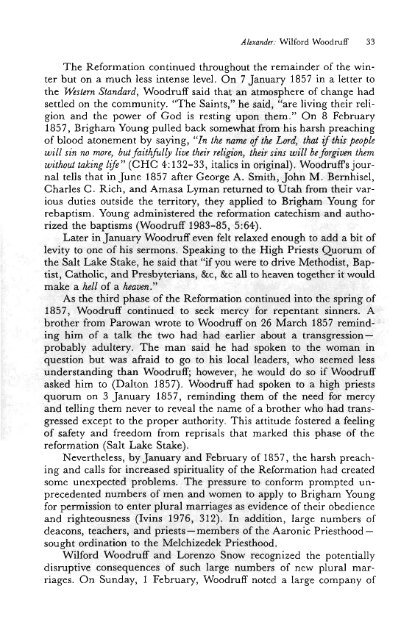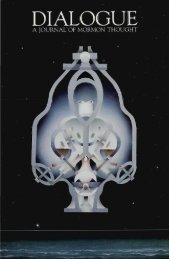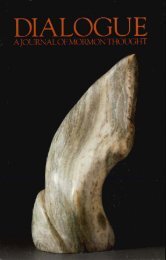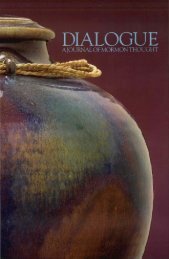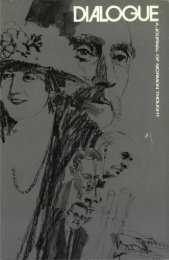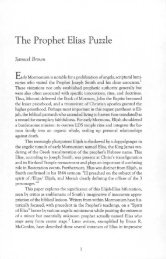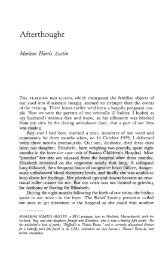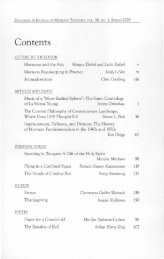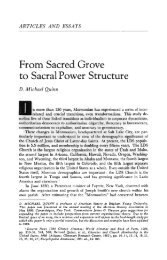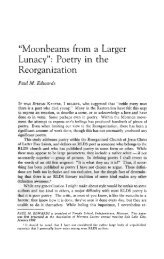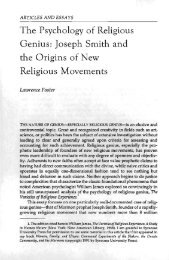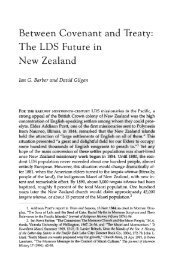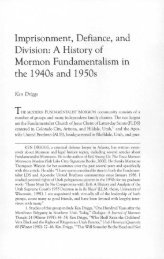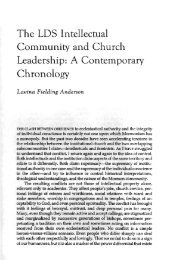Dialogue, Volume 25, Number 2 - Dialogue – A Journal of Mormon ...
Dialogue, Volume 25, Number 2 - Dialogue – A Journal of Mormon ...
Dialogue, Volume 25, Number 2 - Dialogue – A Journal of Mormon ...
Create successful ePaper yourself
Turn your PDF publications into a flip-book with our unique Google optimized e-Paper software.
Alexander: Wilford Woodruff 33<br />
The Reformation continued throughout the remainder <strong>of</strong> the winter<br />
but on a much less intense level. On 7 January 1857 in a letter to<br />
the Western Standard, Woodruff said that an atmosphere <strong>of</strong> change had<br />
settled on the community. "The Saints," he said, "are living their religion<br />
and the power <strong>of</strong> God is resting upon them." On 8 February<br />
1857, Brigham Young pulled back somewhat from his harsh preaching<br />
<strong>of</strong> blood atonement by saying, "In the name <strong>of</strong> the Lord, that if this people<br />
will sin no more, but faithfully live their religion, their sins will be forgiven them<br />
without taking life" (GHC 4:132-33, italics in original). Woodruffs journal<br />
tells that in June 1857 after George A. Smith, John M. Bernhisel,<br />
Charles C. Rich, and Amasa Lyman returned to Utah from their various<br />
duties outside the territory, they applied to Brigham Young for<br />
rebaptism. Young administered the reformation catechism and authorized<br />
the baptisms (Woodruff 1983-85, 5:64).<br />
Later in January Woodruff even felt relaxed enough to add a bit <strong>of</strong><br />
levity to one <strong>of</strong> his sermons. Speaking to the High Priests Quorum <strong>of</strong><br />
the Salt Lake Stake, he said that "if you were to drive Methodist, Baptist,<br />
Catholic, and Presbyterians, &c, &c all to heaven together it would<br />
make a hell <strong>of</strong> a heaven."<br />
As the third phase <strong>of</strong> the Reformation continued into the spring <strong>of</strong><br />
1857, Woodruff continued to seek mercy for repentant sinners. A<br />
brother from Parowan wrote to Woodruff on 26 March 1857 reminding<br />
him <strong>of</strong> a talk the two had had earlier about a transgression —<br />
probably adultery. The man said he had spoken to the woman in<br />
question but was afraid to go to his local leaders, who seemed less<br />
understanding than Woodruff; however, he would do so if Woodruff<br />
asked him to (Dalton 1857). Woodruff had spoken to a high priests<br />
quorum on 3 January 1857, reminding them <strong>of</strong> the need for mercy<br />
and telling them never to reveal the name <strong>of</strong> a brother who had transgressed<br />
except to the proper authority. This attitude fostered a feeling<br />
<strong>of</strong> safety and freedom from reprisals that marked this phase <strong>of</strong> the<br />
reformation (Salt Lake Stake).<br />
Nevertheless, by January and February <strong>of</strong> 1857, the harsh preaching<br />
and calls for increased spirituality <strong>of</strong> the Reformation had created<br />
some unexpected problems. The pressure to conform prompted unprecedented<br />
numbers <strong>of</strong> men and women to apply to Brigham Young<br />
for permission to enter plural marriages as evidence <strong>of</strong> their obedience<br />
and righteousness (Ivins 1976, 312). In addition, large numbers <strong>of</strong><br />
deacons, teachers, and priests — members <strong>of</strong> the Aaronic Priesthood —<br />
sought ordination to the Melchizedek Priesthood.<br />
Wilford Woodruff and Lorenzo Snow recognized the potentially<br />
disruptive consequences <strong>of</strong> such large numbers <strong>of</strong> new plural marriages.<br />
On Sunday, 1 February, Woodruff noted a large company <strong>of</strong>


